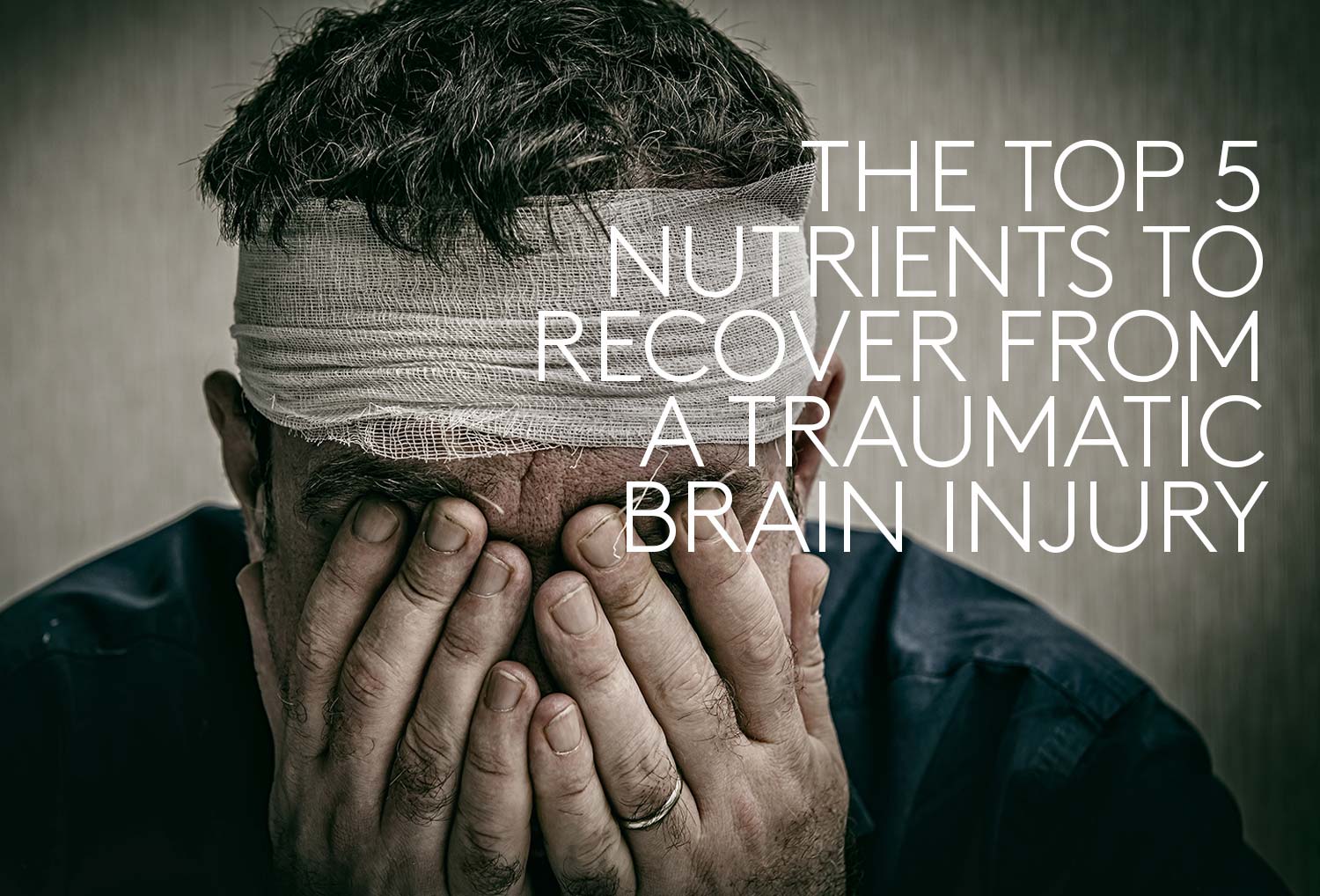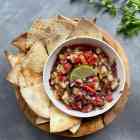The Top 5 Nutrients To Recover From a Traumatic Brain Injury

At NeuroTrition we strive to keep your brain in tip-top condition, and talk a lot about keeping it happy and healthy. But the unfortunate reality is this: a happy, healthy brain, no matter how happy or healthy it is, can still get hurt. Because a traumatic brain injury (aka. TBI) from an accident can happen to anyone. Interestingly, science is showing that nutrition could play a helpful role in TBI recovery. So we compiled a list of some specific nutrients that are KEY to potentially speeding up recovery or mitigating the harmful effects of a brain injury.
But, first, are you wondering what a TBI even is, and why it is so bad?
What is a TBI?
Traumatic brain injuries (TBIs) result from a bump, blow or jolt to the head, or a penetrating injury into the head. Common causes can be a fall, vehicle accident, sports injuries or a violent assault. Brain injuries can have an enormous impact across the full spectrum of brain function – from mood, to cognition, to memory, to motor control – and effects can be long-lasting and debilitating.
Brain injury is super common. It’s the leading cause of death and disability for Canadians under the age of 40.
Brain injury is super common. It’s the leading cause of death and disability for Canadians under the age of 40. Annually, brain injuries affect more people than multiple sclerosis, spinal cord injury, HIV/AIDS and breast cancer combined. Yes. Combined (1).
People tend to think that you have to get knocked out or lose consciousness to have a brain injury, but this isn’t the case. A concussion is a sort of TBI and causes changes to brain function for minutes to hours. Recently, headlines have described the immensely detrimental effect of sports injuries to the brain, particularly the repeated concussions experienced by National Football League players. Devastating stories describe the mental health issues experienced by professional athletes who have suffered frequent concussions, often while young adults (if you like listening to podcasts check out the series Gladiator for more in-depth information on this). Repeated concussions can cause Chronic Traumatic Encephalopathy (CTE) – a progressive condition impacting emotions, thinking abilities and movement (2).
But, before we get to how diet can help following a TBI, we need to understand what happens to our neurons (brain cells) as a result of a brain injury…
What does a TBI do to our brain?
Like any physical injury, TBI causes damage to the structure and function of cells. Brain injuries cause a cascade of damaging events to your neurons. Firstly, the mitochondria inside neurons malfunction. Mitochondria are the parts of cells that produce energy (scientists call them the “powerhouses of the cell”), and they are vital for keeping cells alive. When mitochondria don’t work properly, a toxic build-up of chemicals collects in cells, causing oxidative stress (aka. free radical damage). This then causes inflammation in the brain, called neuroinflammation, which leads to neurodegeneration (the progressive loss of neurons).
The link between TBI and depression is strong: people with a TBI are about 8 times more likely to experience depression.
Over time, the neuroinflammation started by a TBI can spread, and cause depression. The link between TBI and depression is strong: people with a TBI are about 8 times more likely to experience depression (3). This increased incidence of depression following a TBI aligns with the idea of neuroinflammation and depression, where research shows an inflamed brain is likely to be prone to depression (4). Also, any loss of healthy brain function is likely to exacerbate stress, and make you prone to emotional changes and mood imbalances.
You may have heard that suffering repeated TBIs can cause dementia, and that the more concussions you’ve had, the greater your risk of dementia. This is true. TBI does increase the risk of dementia, and it is definitely cumulative. But it depends on 1.) the age when you experience trauma, with more advanced age increasing your risk (5) and 2.) the severity of the trauma as well (6). Under the microscope, the effects of a brain injury can actually look similar to Alzheimer’s disease because amyloid plaques (the characteristic sign of Alzheimer’s disease) may form that further disrupt neuron function (7).
Can diet help the brain recover from an injury?
A healthy diet is paramount for a healthy brain. And it becomes even more critical after a brain injury, so I want to talk about what the science is saying about foods that can support recovery from a TBI. Here are the top 5 nutrients, according to the literature, that make it into our NeuroTrition Rx for TBI recovery.
The Top 5 Nutrients for a TBI Recovery
1. Vitamin E
Vitamin E is an antioxidant, and it works to reduce the toxic chemicals in the brain that cause oxidative stress (hence the term ANTIoxidant) and neuroinflammation. Food sources of vitamin E include nuts (especially almonds and hazelnuts) and seeds (especially sunflower seeds), wheat germ oil, and some fish (like wild salmon and trout). What is the science showing so far? Vitamin E enriched diets improved memory in rats that received head injuries (8) and also reduced signs of neuron death following a head injury in mice that had a predisposition to develop Alzheimer’s disease (9).
2. Nicotinamide
Nicotinamide, also known as niacinamide or vitamin B3 is found in good-quality meat, dairy, nuts, and mushrooms. Nicotinamide plays an important role in the chemical reactions performed by mitochondria to generate energy in cells. In mice, a prolonged dose of nicotinamide provided neuroprotective effects from brain injury, and increased functional recovery (10, 11).
3. Zinc
Zinc is a mineral that has a key role in the regeneration and repair of tissue. Because zinc helps tissue repair as well as reducing neuroinflammation, diets rich in zinc have shown promise in speeding up recovery from TBI (12). Interestingly, blood serum levels of zinc are decreased in people who have just experienced a mild TBI, which could be because more zinc is needed to help with immediate repair processes (13). Zinc-rich foods include red meat (we recommend good-quality, like lean beef, bison, duck, and lamb) shellfish (especially oysters, quite possibly the #1 source), legumes like chickpeas and lentils, eggs, nuts and seeds, dairy (always organic, and at least 2% or whole) and dark chocolate (we recommend to look for chocolate that contains at least 65% cacao).
4. Magnesium
Magnesium is another key mineral needed by our bodies to promote energy, sleep, and balancing blood sugar. Magnesium enriched diets improved recovery following TBI in rats (14), and people who eat poor diets that are low in magnesium have a worse prognosis following a TBI, reporting reduced energy and poorer sleep (15). Foods that are chock-full of magnesium include green leafy veggies, algae, avocados, figs, bananas, raspberries, nuts and seeds, beans and cacao (so, the higher cacao percentage in your chocolate, the better).
5. Omega-3 fatty acids
Diets abundant with omega-3 fatty acids are pretty much synonymous with brain health. We love omega-3 rich foods here at NeuroTrition because science backs how amazingly beneficial diets rich in omega-3s are for memory and mood! Oily fish like wild salmon, black cod, halibut, trout, anchovy, sardine and mackerel are top-notch sources of Eicosapentaenoic acid (EPA) and Docosahexaenoic acid (DHA), as is plant-based algae. Chia, hemp and flaxseeds, as well as walnuts and Brussel sprouts, are high in alpha-linolenic acid (ALA) which your body converts to EPA and DHA. However, some research suggests the conversion is not always reliable and it can vary from person to person.
It appears that DHA, specifically, is vital for not one but two things relating to TBI. In fact, science suggests that diets high in DHA can act as both a protective agent against the effects of a brain injury (4) and also speed recovery after a TBI (16,17), so providing an awesome double function.
Some real food for thought
The data are suggesting that YES, certain vitamins and minerals can help reduce the cascade of damaging effects caused by a TBI, namely by reducing neuroinflammation and oxidative stress. But we’ve got to keep in mind that vitamin and mineral supplements haven’t been used yet in clinical trials for people with TBI. The initial studies in rats and mice (called preclinical, which means they come before clinical) are crucial for showing that diet supplements could help to improve existing therapies and fix some of the long-term consequences of TBI. Regardless of how they may or may not impact TBI (and we’ll be watching closely as the science develops on this), these nutrients have been shown to promote overall brain health. So while the science is still out for TBI implications in humans, we do know that these nutrients have brainy benefits at all stages of life and in rodent models of TBI.
What we do know is that eating junk foods is bad for your brain, because these highly refined and processed convenience foods increase inflammation and oxidative stress. So, in a state where the brain is injured, eating these foods would exacerbate injury and/or dramatically prolong recovery.
- References
-
- https://www.braininjurycanada.ca/
- McKee, A. C., Cantu, R. C., Nowinski, C. J., Hedley-Whyte, E. T., Gavett, B. E., Budson, A. E., ... & Stern, R. A. (2009). Chronic traumatic encephalopathy in athletes: progressive tauopathy after repetitive head injury. Journal of Neuropathology & Experimental Neurolo-gy, 68(7), 709-735.
- Bombardier C.H, et al. (2010). Rates of major depressive disorder and clinical outcomes following traumatic brain injury. JAMA, 303, 938-1945.
- Dantzer, R. (2012). Depression and inflammation: an intricate relationship. Biol. Psychiatry, 71, 4-5.
- Johnson, V. E., & Stewart, W. (2015). Traumatic brain injury: age at injury influences dementia risk after TBI. Nature Reviews Neurology, 11(3), 128.
- Smith et al. (2013). Chronic neuropathologies of single and repetitive TBI: sub-strates of dementia? Nature Reviews Neurology, 9, 211–221.
- Johnson, V. E., Stewart, W., & Smith, D. H. (2010). Traumatic brain injury and amyloid-β pathology: a link to Alzheimer's disease? Nature Reviews Neuroscience, 11(5), 361.
- Wu, A., Ying, Z., & Gomez-Pinilla, F. (2004). Dietary omega-3 fatty acids normalize BDNF levels, reduce oxidative damage, and counteract learning disability after traumatic brain injury in rats. Journal of neurotrauma, 21(10), 1457-1467.
- Conte, V., Uryu, K., Fujimoto, S., Yao, Y., Rokach, J., Longhi, L., ... & Praticò, D. (2004). Vitamin E reduces amyloidosis and improves cognitive function in Tg2576 mice following repetitive concussive brain injury. Journal of neurochemistry, 90(3), 758-764.
- Haar, C. V., Anderson, G. D., & Hoane, M. R. (2011). Continuous nicotinamide administration improves behavioral recovery and reduces lesion size following bilateral frontal controlled cortical impact injury. Behavioural brain research, 224(2), 311-317.
- Goffus, A. M., Anderson, G. D., & Hoane, M. R. (2010). Sustained delivery of nicotina-mide limits cortical injury and improves functional recovery following traumatic brain injury. Oxidative medicine and cellular longevity, 3(2), 145-152.
- Cope, E. C., Morris, D. R., Scrimgeour, A. G., VanLandingham, J. W., & Levenson, C. W. (2011). Zinc supplementation provides behavioral resiliency in a rat model of traumatic brain injury. Physiology & behavior, 104(5), 942-947.








